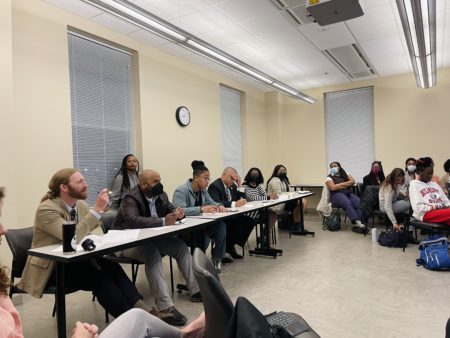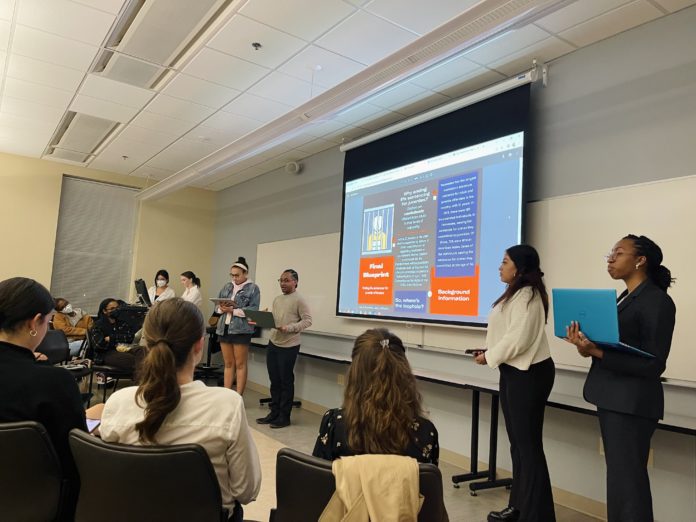On a recent Tuesday evening at Belmont University, a team of four students from three universities—Fisk University, Vanderbilt University and Belmont University—presented their ideas on reimagining parole for women’s reentry after incarceration.
The students shared their research and plans to an equally diverse group from varying backgrounds and fields of study across the three universities. Six groups presented as part of the course called Bridging The Gap, and they took on a myriad of issues around incarceration including the school-to-prison pipeline, life sentences for juvenile defenders, the effects of mental health in sentencing and the cost-benefit analysis of prison reform.
Bridging The Gap (BTG) was founded by Simon Greer, a community organizer and social change leader, who first piloted the initiative between Oberlin College and Spring Arbor University before expanding to additional schools. The mission of BTG is “to transform the culture of higher education to one where the heroes are the bridge-builders.” To accomplish this aim, BTG provides immersive training courses around a topic and encourages students to engage in courageous conversations across lines of difference to help address society’s most pressing problems.
“The most valuable lesson I learned from this course was that your solution to a problem may only be one piece of the puzzle,” said Keneisha Herbert, a Belmont senior majoring in public health. “Be open to change and know that many issues are multifaceted. This notion became clear after hearing from multiple stakeholders in the system, including Tennessee Senators, correctional officers, an abolitionist, wardens and former inmates.”
University Minister Rev. Heather Gerbsch Daugherty served as a Belmont facilitator for the course along with Dr. La Tanya Rogers, professor of Literature & Drama at Fisk; Laurie Woods, senior lecturer in the Sociology Department at Vanderbilt; Vernisha Crawford from BTG; and Sarah Wong, a senior at Oberlin College who served as teaching assistant. According to Bridging The Gap: “This course is not an effort to dismiss the deep and genuine political differences in our country. It is a concrete step to give students — our future leaders — the tools to find areas of common ground, create constructive tension, understand our shared humanity and solve pressing problems with those of different backgrounds and beliefs”.
The students’ final presentations also were scored by a diverse group of panelists and professors from the participating universities.

“I was so proud of our students — coming together with students you did not know from campuses across Nashville and talking deeply about personal and challenging issues is no easy task,” Daugherty said. “Throughout the semester they worked hard to build genuine and deep relationships across differences that may exist and delved deeply into the challenging topic of the criminal justice system and prison reform. They listened to the stories of stakeholders from across the system, considered a wide variety of viewpoints, and worked together to make substantial policy reform blueprints. I have loved seeing each of them grow this semester through our work — they have given a living example of what it means to ‘Bridge the Gap.’”
In May, Belmont will host a Bridging The Gap conference along with seven other faith-based institutions.
“So often we do not listen to each other or have those tough conversations that will educate ourselves on another’s experiences,” said Herbert, reflecting on her time as a student in the course. “Social change can build from these interactions, and I wanted to be a part of a program that encourages deep and informed engagement on pressing issues. Knowing this, I was certain it would be beneficial to learning how to navigate issues in my community once starting my career.”



